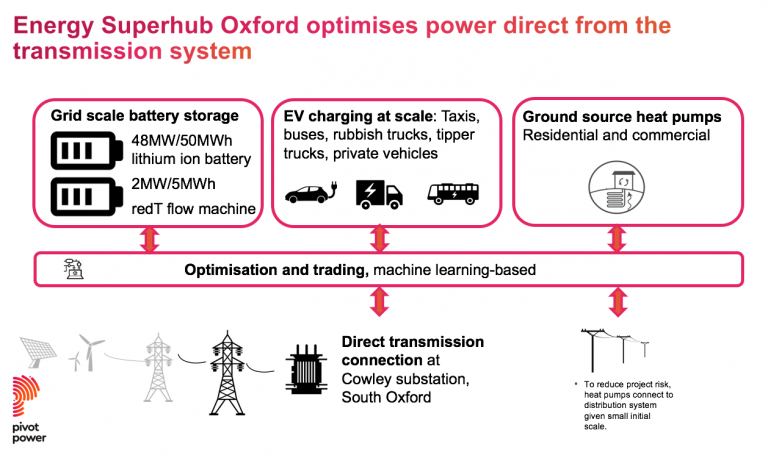The new 50MW hybrid battery to be installed in Cowley, Oxford. Pic: PivotPower
Oxford’s £42m energy superhub could go live from the end of this year
A multi-million energy superhub, which includes the ‘largest hybrid battery ever deployed’, is about to enter the build phase and should go live from the end of this year. The 50MW grid-scale battery will be housed in an electricity substation in Cowley, Oxford, creating a new connection to the national grid and powering a 10km-network of electric vehicle (EV) charge points. Ground source heat pumps will also be installed in around 300 homes.
The battery is a key component of Energy Superhub Oxford (ESO), a £42m project that sets out to integrate and dramatically decarbonise energy, heat and transport systems, all major sources of carbon emissions in cities.
Energy Superhub Oxford aims to deliver the power capacity and charge points that will be required by electric vehicles when they become more widely used, ensuring that EV’s don’t overload the national grid and avoiding expensive upgrades to the local power network.
The network of chargers will be installed via a private wire that will connect the Cowley substation to Oxford city. Around 100 ultra-rapid chargers are planned, with the first 50 to be placed in Horspath. ESO will offer vehicle charging to local electric commercial fleets, including buses, taxis and waste collection vehicles.

Scope of the ESO project. Pic: PivotPower
Nicole Gilbert of energy storage specialist Pivot Power, which is leading the project delivery, explained to TechTribe Oxford that ESO aims to tackle the key challenge of power capacity for EV’s. She pointed out that corporate firms planning to invest in electric fleets are facing barriers in how to overcome capacity challenges, in terms of available power and charge points. This includes Oxford Direct Services, which provides services for Oxford City Council and is investing in electric vehicles.
Oxford University’s Environmental Change Institute is assessing the impact of the project on select groups of people in Oxford. The Institute’s Sam Hampton explains: “Part of the task is to demonstrate that there are benefits to addressing the challenges of decarbonising electricity, transport and heat in an integrated way.”

Sam Hampton of the Environmental Change Institute. Pic: John Cairns
PivotPower’s involvement in the project began when they identified sites around the UK with substations that were close to populations and road networks. These could be deployed to boost power supply, in order to tackle complications around access to large volumes of power.
ESO will also heat around 300 homes using ground source heat pumps. Kensa Contracting will install heat pump systems with smart controls optimised to take advantage of time-of-use tariffs. This optimisation results in load shifting of heat production, moving energy use away from peak times, thereby reducing impact on the grid from the electrification of heating, whilst reducing carbon emissions by up to 80 per cent.
The consortium-led project is the world’s first demonstration of this type of integration, and is funded under the UK government’s Prospering for the Energy Revolution programme. ESO is one of four demonstrator projects in Oxfordshire which are all focused on integrating energy, transport and heat.
ESO partners are Oxford City Council, Pivot Power, Habitat Energy, Kensa Contracting, redT energy and Oxford University. Oxford-based Habitat Energy will be providing the intelligence to optimise the trading of the battery storage in the power markets.
The University’s Environmental Change Institute and Department of Engineering Science will assess the impacts of the project with a focus on transport, heating and local governance, and advise on how they can be replicated, both across the UK and abroad.
ESO was first announced in March 2019 as a three-year project with design, build and test phases running until 2022.
